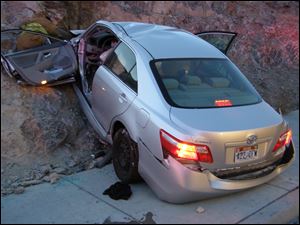
EDITORIAL
Road hazard
Toyota Motor Corp. is paying dearly for its shameful conduct
3/24/2014
In this 2010 photo released by the Utah Highway Patrol, a Toyota Camry is shown after it crashed as it exited I- 80 in Wendover, Utah. Police suspect problems with the Camry's accelerator or floor mat caused the crash that left two people dead and two others injured.
Toyota Motor Corp. is paying dearly for its shameful conduct in handling dangerous defects in millions of vehicles. Now it must demonstrate that it has learned from its misdeeds.
The $1.2 billion that Toyota will pay to settle a federal investigation is the largest criminal penalty for an automaker in the United States, and that’s on top of more than $1 billion it agreed to pay in 2012 to resolve hundreds of claims from owners. Beyond that, the Japanese manufacturer paid more than $66 million in fines because it did not report acceleration problems when it first learned of them.
Toyota for too long had insisted the problems were the result of driver error or poor maintainance, delaying the design changes necessary to prevent sudden, unintended acceleration.
The automaker, which expects record net income of $18.7 billion for the fiscal year ending March 31, can well afford the penalties and settlements.
The damage to its brand may be incalculable, and deservedly so. As U.S. Attorney General Eric Holder, Jr., said when announcing the criminal settlement, which mandates continued corporate cooperation with authorities, Toyota ignored safety laws and “protected its brand ahead of its own consumers.”
There’s a lesson in that for other manufacturers and, more generally, any firm that makes consumer goods: Put the customer first.